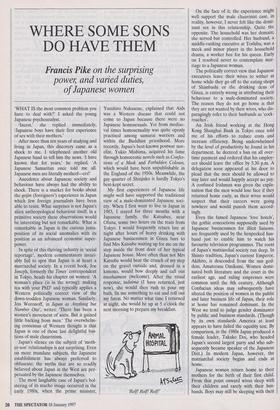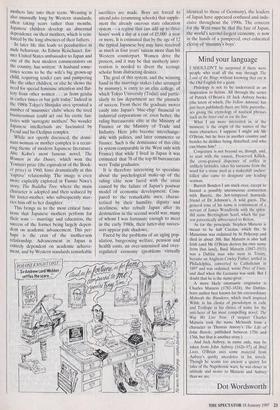WHERE SOME SONS DO HAVE THEM
Francis Pike on the surprising
power, and varied duties, of Japanese women
`WHAT IS the most common problem you have to deal with?' I asked the young Japanese psychoanalyst.
`Incest,' she replied immediately, `Japanese boys have their first experience of sex with their mothers.'
After more than ten years of studying and living in Japan, this discovery came as a shock to me. I telephoned another old Japanese hand to tell him the news. 'I have known that for years,' he replied. 'A Japanese Samaritan once told me all. Japanese men are literally motherf—ers!'
Anecdotes about Japanese society and behaviour have always had the ability to shock. There is a market for books about the geijin (foreigners') experience in Japan which few foreign journalists have been able to resist. What surprises is not Japan's alien anthropological behaviour itself; in a primitive society these observations would be interesting but not remarkable. What is remarkable in Japan is the curious juxta- position of its social anomalies with its position as an advanced economic super- power.
In spite of this thriving industry in 'social reportage', modern commentators invari- ably fail to spot that Japan is at heart a matriarchal society. In a recent book, Joe Joseph, formerly the Times' correspondent in Tokyo, heads his chapter on women: 'A woman's place (is in the wrong): making tea with your PhD' and typically applies a Western politically correct view of the down-trodden Japanese woman. Similarly, Jon Woronoff, in Japan as Anything but Number One', writes: 'There has been a women's movement of sorts. But it gained little backing from men.' The overwhelm- ing consensus of Western thought is that Japan is one of those last delightful bas- tions of male chauvinism.
Japan's silence on the subject of 'moth- er-son' relationships is not surprising. Even on more mundane subjects, the Japanese establishment has always preferred to obfuscate; the myths that are so readily believed about Japan in the West are per- petuated by the Japanese themselves.
The most laughable case of Japan's bol- stering of its macho image occurred in the early 1980s, when the prime minister, Yasuhiro Nakasone, explained that Aids was a Western disease that could not come to Japan because there were no Japanese homosexuals. Yet from mediae- val times homosexuality was quite openly practised among samurai warriors and within the Buddhist priesthood. More recently, Japan's best-known postwar nov- elist, Yukio Mishima, acquired his fame through homoerotic novels such as Confes- sions of a Mask and Forbidden Colours, which would have been unpublishable in the England of the 1950s. Meanwhile, the gay quarter of Shinjuku is hardly Tokyo's best-kept secret.
My first experiences of Japanese life might well have supported the traditional view of a male-dominated Japanese soci- ety. When I first went to live in Japan in 1983, I stayed for three months with a Japanese family, the Katsubes, near Ofuna, some two hours on the train from Tokyo. I would frequently return late at night after hours of heavy drinking with Japanese businessmen in Ginza bars to find Mrs Katsube waiting up for me on the step inside the front door of her typical Japanese house. More often than not Mrs Katsube would hear the crunch of my step on the gravel outside and, dressed in a kimono, would bow deeply and call out irasshaimese (welcome). After the ritual response, tadaima (I have returned, just now), she would then rush to pour my bath, fix me something to eat and roll out my futon. No matter what time I returned at night, she would be up at 5 o'clock the next morning to prepare my breakfast.
Rolf! Rolf! Rolf' On the face of it, the experience might well support the male chauvinist case, in reality, however, I never felt like the domi- nant sex in this relationship. Quite the opposite. The household was her domain; she served but controlled. Her husband, a middle-ranking executive at Toshiba, was a meek and minor player in the household drama, a worker bee for his queen. Early on I resolved never to contemplate mar- riage to a Japanese woman.
The politically correct view that Japanese executives leave their wives to wither at home while they go off to the eating shops of Shimbashi or the drinking dens of Ginza, is entirely wrong in attributing their behaviour to a male-dominated society. The reason they do not go home is that they are not wanted by their wives, who dis- paragingly refer to their husbands as 'cock- roaches'.
An Irish friend working at the Hong Kong Shanghai Bank in Tokyo once told me of his efforts to reduce costs and increase efficiency. Being underwhelmed by the level of productivity he found in his department, he decreed a ban on all over- time payment and ordered that his employ- ees should leave the office by 5.30 p.m. A delegation soon appeared at his door to plead that the men should be allowed to stay later and would happily accept no pay. A confused Irishman was given the expla- nation that the men would lose face if they returned home early, as their wives would suspect that their careers were going nowhere and would punish them accord- ingly.
Even the famed Japanese 'love hotels', the gothic concoctions supposedly used by Japanese businessmen for illicit liaisons, are frequently used by the henpecked hus- band just to enable him to watch his favourite television programmes. The roots of Japan's matriarchal society run deep. In Shinto tradition, Japan's current Emperor, Akihito, is descended from the sun god- dess, Amaterasu Omikami. Women domi- nated both literature and the court in the earliest age, and ruling empresses were common until the 8th century. Although Confucian ideas may subsequently have altered the position of women in the public and later business life of Japan, their role at home has remained dominant. In the West we tend to judge gender dominance by public and business standards. (Though by its own standards America at least appears to have failed the equality test. By comparison, in the 1980s Japan produced a female leader, Takako Doi, who headed Japan's second largest party and who sub- sequently became speaker of the Japanese Diet.) In modern Japan, however, the matriarchal society begins and ends at home.
Japanese women return home to their mothers for the birth of their first child. From that point onward wives sleep with their children and rarely with their hus- bands. Boys may still be sleeping with their mothers late into their teens. Weaning is also unusually long by Western standards, Often taking years rather than months. Japanese children develop an abnormal dependence on their mothers, which is rein- forced by the long absences of their fathers. In later life this leads to peculiarities in male behaviour. As Edwin Reischauer, for- mer United States ambassador to Japan and one of the best modern commentators on the country, has written: 'A husband some- times seems to he the wife's big grown-up child, requiring tender care and pampering like the other children, or else he shows the need for special feminine attention and flat- tery from other women . . . as from geisha in earlier times or bar girls today.' Indeed in the 1980s Tokyo's Shinjuku area sprouted a number of 'mummies' clubs' where the tired businessmsan could act out his erotic fan- tasies with 'surrogate mothers'. No wonder Japanese intellectuals are fascinated by Freud and his Oedipus complex.
While not openly discussed, the domi- nant-woman or mother complex is a recur- ring theme of modern Japanese literature. Abe Kobo's most famous novel, The Women in the Dunes, which won the Yomuiri prize (the equivalent of the Book- er prize) in 1960, hints dramatically at this `captive' relationship. The image is even more explicitly explored in Fumio Niwa's story, The Buddha Tree, where the main character is adopted and then seduced by his foster-mother, who subsequently mar- ries him off to her daughter.
This brings us to the most critical func- tions that Japanese mothers perform for their sons — marriage and education, the success of the former being largely depen- dent on academic advancement. This per- haps is the crux of the mother-son relationship. Advancement in Japan is entirely dependent on academic achieve- ment, and by Western standards remarkable sacrifices are made. Boys are forced to attend juku (cramming schools) that supple- ment the already onerous state education system — a regime that can add up to three hours' work a day at a cost of £5,000 a year or more. It is estimated that by the age of 12 the typical Japanese boy may have received as much as four years' tuition more than his Western counterpart. Women drive the process, and it may be that motherly inter- vention is needed to divert the teenage scholar from distracting desires.
The goal of this system, and the winning hand in the marriage stakes (also arranged by mummy), is entry to an elite college, of which Tokyo University (Todai) and partic- ularly its law department are the pinnacle of success. From there the graduate moves easily into Japan's `blue-chip' financial or industrial corporations or, even better, the ruling bureaucratic elite at the Ministry of Finance or the Ministry of Trade and Industry. Here jobs become interchange- able with politics, and later commerce or finance. Such is the dominance of this elite (a system comparable in the West only with France) that while I lived in Japan it was estimated that 78 of the top 80 bureaucrats were Todai graduates.
It is therefore interesting to speculate about the psychological make-up of the ruling elite now faced with the crisis caused by the failure of Japan's postwar model of economic development. Com- pared to the remarkable men, charac- terised by their humility, dignity and steeliness, who rebuilt Japan after its destruction in the second world war, many of whom I was fortunate enough to meet in the early 1980s, their latter-day succes- sors appear pale shadows..
Faced by the problems of an aging pop- ulation, burgeoning welfare, pension and health costs, an over-unionised and over- regulated economy (problems virtually identical to those of Germany), the leaders of Japan have appeared confused and inde- cisive throughout the 1990s. The concern for the West must be that the fate of Japan, the world's second-largest economy, is now in the hands of a pampered, over-educated clerisy of 'mummy's boys'.



























































 Previous page
Previous page